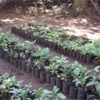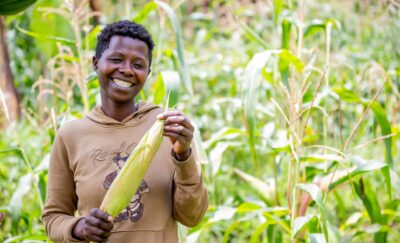News
19 October 2011
Tanzania forest groups earning more income as activities expand

 You can read more information on this project here.
You can read more information on this project here.
Farm Africa has made excellent progress during 2011 with its Participatory Forest Management Project, situated in the Nou Forest in the Babati and Mbulu districts of northern Tanzania.
The project’s core objective is to improve both the livelihoods of those living in the forest and the condition of the forest. It places a particular emphasis on the participation in the project of the forests’ varied stakeholders.
This means involving local communities and district government officials in managing the forest and conserving its resources.
Forest Enterprise Groups driving project work
One of the project’s key recent achievements has been the establishment of 39 new Forest Enterprise Groups, drawn from communities living in the 13 villages taking part in the project. The 39 groups are at the heart of the project and are driving its work: they have a total membership of 606 members, of which an impressive 50% are women.
Each group has also elected from within its membership a chairperson, a treasurer and a secretary to lead the groups.
These Forest Enterprise Group are co-ordinating the training of their memberships in an impressive range of activities which allow people to earn income from the forest without felling trees. Together with local government forestry staff and Farm Africa project staff, all the groups were involved in assessing which non-timber enterprises were feasible for their particular village.
From the list of feasible activities, groups from each village have now chosen three activities to be trialled in the village. The activities they have chosen from are:
Mushroom farming; butterfly farming; eco-tourism; sisal farming; raffia weaving; energy-saving stoves production; fish farming; and sandalwood production.
In addition to its three chosen activities, each village is also participating in the core livelihood activities of beekeeping and running tree nurseries.
Tree Nurseries
Twelve tree nurseries have been set up so far. Two hundred and ten farmers are working in the nurseries, including 87 women. They have been trained in tending and rearing tree seedlings.
The farmers have also been trained in: fencing; soil mixing; potting plants; seedbed preparation; tree seedling sowing; collection of forest soil and manure for the production of potting soil.
In addition, Farm Africa has provided farmers with essential materials like polythene tubings, tools and initial tree seedlings.
Since April 2011 the 12 nurseries together have raised: 5,312 sustainable timber seedlings (mostly eucalyptus used for construction poles); 1,631 fruit tree seedlings; 673 ornamental tree seedlings (mango, orange and avocado); and 4,344 fence tree seedlings.
Between April and August 2011 the tree nurseries have sold 3,380 timber seedlings to members of the wider forest community. This equates to sales of 1,543,000 Tanzanian Shillings (£602).
Beekeeping
The project is working with 12 beekeeping groups, made up of 234 individual members.
906 Langstroth hives have been distributed throughout the villages. Langstroths are hives which can be placed on planks at waist height and are therefore preferred to traditional hives which hang inaccessibly high up in trees. Langstroths are also preferred as they can be re-used after honey has been collected.
Group members contributed 10% of hive costs prior to receiving them and have since paid a further 15% through a savings and credit scheme. To make beekeeping more sustainable, 26 local carpenters have been identified and trained in construction of Langstroth hives.
Farm Africa has also facilitated the bee keeping groups to work together to form the Manyara Beekeepers Association. This association enables groups to consolidate their produce and to sell it collectively. Collective selling improves access to markets and also offers the beekeepers collective bargaining power for the marketing of their produce.
The Manyara Beekeepers Association is also helping the beekeeping groups to work collectively to build up a brand for the local honey as a means of securing increased long-term income.
Raffia Weaving
Raffia is a type of grass grown next to streams. It has traditionally been used by women to weave both baskets and mats for household use.
In recent months 67 women and 16 men have been trained by Farm Africa Project Staff and government extension staff in the production of high quality and attractive designs. Weavers are also being connected to potential markets for their products such as tourist sites at the nearby Ngorogoro Crater and Manyara National Park.
Following their training, raffia weavers have made 143 different products which have generated 617,000 Tanzanian Shillings (£241) worth of income.
Fish Farming
One of the Enterprise Groups is trialling fish farming in Mongahay village. As well as providing alternative income, the group hopes that fish farming will also prove to be an additional source of food for the families participating in the activity.
So far, 34 families have been trained in basic fish farming techniques. These include: digging ponds, identifying different types of both fish and fish food, fish harvesting and storage.
Mushroom Farming
208 farmers have been trained recently in mushroom farming. Key aspects of their training include identification of edible and non-edible mushrooms as well as the diseases mushrooms are prone to. Training has also resulted in the identification of three sites within the forest which are particularly well-favoured to mushroom growing.
Butterfly Farming
Butterfly pupae can be sold for export to museums and exhibitions abroad. The sale of butterflies is therefore a source of valuable additional income for the farmers and Farm Africa is training farmers in the project area to catch butterflies in a way that does not harm or distress them. Farmers are also being trained in identification of different species as well as males and females, and the best host plants for butterflies. With this knowledge, farmers are able to start up their own businesses.
In 2010 Farm Africa trained 187 farmers from 11 separate butterfly farming groups, including 87 women.
Ecotourism
Five Forest Enterprise Groups have identified ecotourism as a potential alternative source of income and, supported by Farm Africa project staff and local district staff, have conducted a survey to identify attractive sites like waterfalls for tourists to visit. The groups have established a tourist trail route by ensuring that there is a clear path and are completing the labelling of different types of trees along the tourist path.
To help support this, and many of our other projects, please make a donation today.




